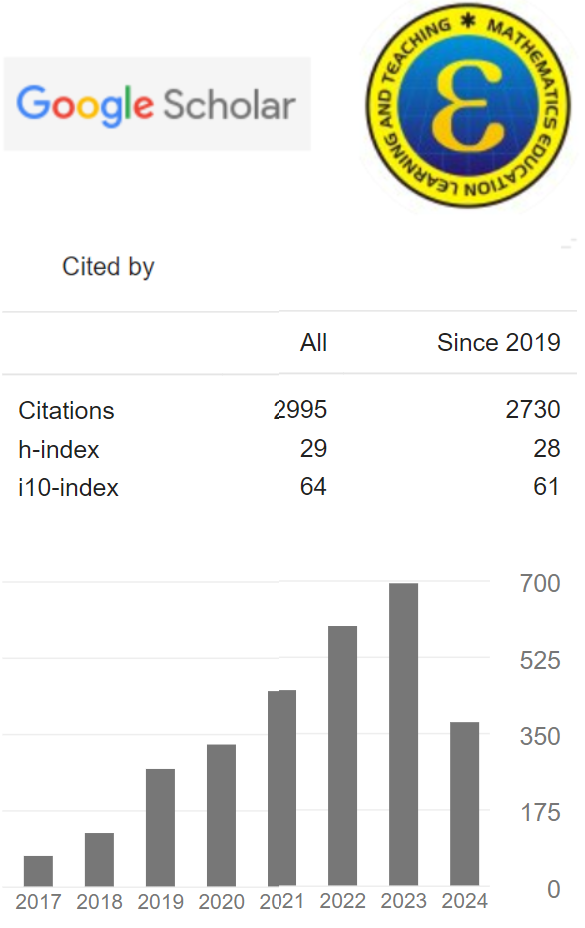PERBANDINGAN KEEFEKTIFAN MODEL PEMBELAJARAN PROBLEM BASED LEARNING (PBL) DAN DISCOVERY LEARNING (DL) DITINJAU DARI KEMAMPUAN PEMECAHAN MASALAH
(1) Universitas PGRI Yogyakarta
(2) Universitas PGRI Yogyakarta
(3) Universitas PGRI Yogyakarta
(*) Corresponding Author
Abstract
This study aims to compare the effectiveness of Problem Based Learning (PBL) and Discovery Learning (DL) learning models concerning of problem-solving abilities of grade students of 4 Pandak Junior High School. This type of research is quasi-experiment with The Nonequivalent Posttest-Only Control Group Design. The population of this research is students grade  state of 4 Pandak Junior High School. The samples for this research are students grade A and students grade B. The instruments of this research are observation, test, and documentation. Then data analysis techniques are a normality test using Kolmogorov Smirnov, homogenity test using Levene’s test, and hypothesis test use T-test with 0,05 as it significantly. The final result of this research are (1) Problem Based Learning (PBL) models in terms of students mathematical problem-solving skills is effective are students grade  of 4 Pandak Junior High School, it analyzed with one sample t-test method and it shown that  ); (2) Discovery Learning (DL) models in terms of students mathematical problem-solving skill is effective are students grade  of 4 Pandak Junior High School, it analyzed with one sample t-test method and it shown that  ; (3) There are differences between Discovery Learning (DL) learning models and Problem Based Learning (PBL) learning models and shown by the Discovery Learning (DL) learning model is more effective than Problem Based Learning (PBL) learning models in terms of problem solving abilities are students grade  of 4 Pandak Junior High School. It is proved with two samples t-test method, and the result is  .
Keywords
Full Text:
PDFReferences
Anike, & Handoko, H. (2018). Profil Kognitif Berfikir Kreatif Siswa Pada Pembelajaran Matematika Model Jigsaw Melalui Pendekatan Discovery Learning. EduMa, 7(1), 109-118.
Cahyo, A. N. (2013). Panduan Aplikasi Teori-Teori Belajar Mengajar. Jogjakarta: Diva Press.
Fadillah, S. (2009). Kemampuan Pemecahan Masalah Matematis dalam Pembelajaran Matematika. Prosiding Seminar Nasional Penelitian, Pendidikan dan Penerapan MIPA (pp. 553-558). Yogyakarta: Universitas Negeri Yogyakarta.
Fathurrohman, M. (2015). Model-Model Pembelajaran Inovatif: Alternatif Desain Pembelajaran yang Menyenangkan. Jogjakarta: Ar-Ruzz Media.
Hidayatillah, L. N., & Rahadi, M. (2013). Perbedaan Kemampuan Pemecahan Masalah Matematis Siswa yang Mendapatkan Model Pembelajaran Kooperatif Tipe Teo Stay Two Stray dengan yang Mendapatkan Model Pembelajaran Numbered Head Together. Mosharafa, 2(3), 155-167.
Hosnan, M. (2014). Pendekatan Saintifik dan Kontekstual dalam Pembelajaran Abad 21. Bogor: Penerbit Ghalia Indonesia.
Istikomah, D. A., & Jana, P. (2018). Kemampuan Pemahaman Konsep Matematis Mahasiswa Melalui Pendekatan Pembelajaran Saintifik dalam Perkuliahan Aljabar Matrik. Prosiding Seminar Nasional Etnomatnesia (pp. 927-932). Yogyakarta: UST.
Lestari, K. E., & Yudhanegara, M. R. (2015). Penelitian Pendidikan Matematika (Panduan Praktis Menyusun Skripsi, Tesis, dan Karya Ilmiah dengan Pendekatan Kuantitatif, Kualitatif, dan Kombinasi Disertai dengan Model Pembelajaran dan Kemampuan Matematis. Bandung: PT Refika Aditama.
Persada, A. R. (2016). Pengaruh Model Pembelajaran Penemuan Terbimbing (Discovery Learning) Terhadap Kemampuan Koneksi Matematika Siswa. EduMa, 5(2), 23-33.
DOI: 10.24235/eduma.v8i1.3203
Article Metrics
Abstract view : 323 timesPDF - 89 times
Refbacks
- There are currently no refbacks.
Copyright (c) 2022 Eduma : Mathematics Education Learning and Teaching


.png)










